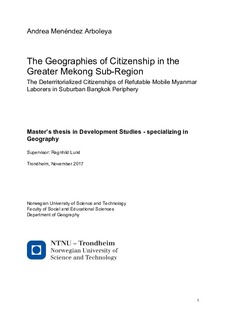| dc.description.abstract | According to recent statistics published by the International Labor Organization, it is estimated that around 150 million people are currently working in a country different from their own country of birth. When resettling permanently in a new country, all the international labor migrants compromise their relationships with their home communities, including the political relationship with their countries of birth and hence, their citizenships, since the current consensus on citizenship is connected to ideas of national political territories and national identity. This paper is a contribution to the creation of an empirically-based theoretical construct that challenges this dominant rhetoric on citizenship.
By adopting a human geographical lens as well as a dual relational approach to citizenship, this thesis explores the interlinkages between citizenship, mobility, and territory in a context of international labor migration in today’s most economically thriving and ethnically complex region in the world: The Greatest Mekong Sub-Region in Southeast Asia. More specifically, this paper unveils how do the Myanmar laborers in the Northern periphery of Bangkok Metropolitan Region think, feel, practice, and experience their everyday lived citizenships.
It can be argued that although Myanmar deterritorialized actors think themselves as territorial members of their home country, they barely manage to verbalize what citizenship is for them. From an emotional point of view, Myanmar deterritorialized citizenships are robust and resilient; regardless ethnicity, the workers feel like belonging to the Union of Myanmar. In contrast, the practices of Myanmar citizenships in Thailand are alarmingly suppressed because of structural reasons such as the repressive political system in force and worker’s deficient patterns of mobilities, something that entails a refutable experience of Myanmar citizenship dominated by fear and a sense of alienation. | nb_NO |
